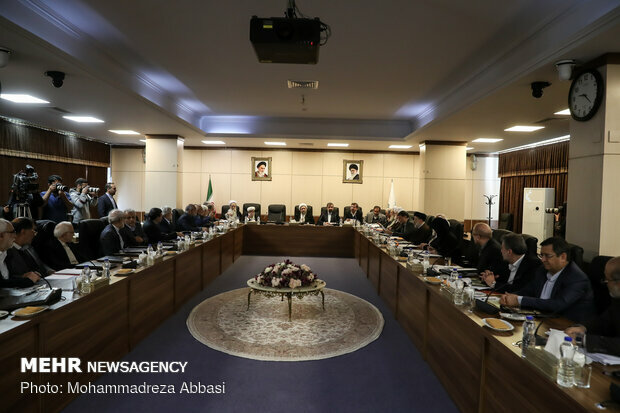Decision on Palermo postponed to next calendar year
Rezaee says Expediency Council’s decision on Palermo is dependent on FATF and Europe’s conduct

TEHRAN – A member of the Expediency Council said on Saturday that the fate of the bill on UN Convention against Transnational Organized Crime, also known as Palermo Convention, was not decided during the council’s meeting which was held earlier in the day.
Gholamreza Mesbahi-Moghadam said making a decision on the issue will be postponed till the next Iranian calendar year, which will start on March 21, Mehr reported.
He added that the council members thoroughly discussed the content of the bill and finally voted to postpone the decision-making.
Abbas-Ali Kadkhodaei, spokesman for the Guardian Council, also pointed to the CFT and Palermo bills, saying no one is afraid of holding a referendum on the bills.
Government officials, including Foreign Minister Mohammad Javad Zarif, have said there is no guarantee that the economic situation would get better if Iran joins the FATF problems will increase if Iran fails to ratify it.
The ratification of the CFT (the convention against the financing of terrorism), and Palermo, which are prerequisites to join the FATF, has faced stiff opposition by some Expediency Council members. The opponents, who hold the majority in the council, argue that many ambiguities surround the CFT.
The opposition to the CFT is so strong that some political activists, who favor joining the FATF, have proposed a referendum on the bill.
But, Kadkhodaei said, “Until the legal authorities have not fulfilled their duties, holding a referendum is not appropriate because currently the Expediency Council is still examining the bills.”
“Regarding Palermo, the issues found in its content by the Guardian Council were fixed but the issues raised by the [council’s] Supervisory Board still persist and according to the constitution, we submitted those issues as the council’s,” he said, adding, “Therefore, those issues, after the Majlis and the council disagreed on them, were sent to the Expediency Council and are being examined there.”
“Also regarding the CFT, the problems we raised have not been fixed and are on the agenda of the Expediency Council,” Kadkhodaei explained.
Majid Ansari, a member of the Expediency Council who was vice president for legal affairs in President Rouhani’s first administration, is of the proponents of holding referendum on the FATF.
‘Decision dependent on FATF and Europe conduct’
Also on Saturday, Mohsen Rezaee, secretary of the Expediency Council, said the council’s final decision on the bills will be dependent upon the FATF and Europe’s conduct and whether they act in a “constructive manner” toward Iran.
“For the next year, we have the examining of the two bills on the agenda, and in the meantime, the FATF’s conduct will be noted because on the one hand it praises Iran’s measures and on the other it has had some ambiguities,” he remarked.
Rouhani has said failure to join the FATF is a kind of self-sanctioning.
Speaking at a gathering on Feb. 26 in Tehran, Rouhani argued for better relations with the world, especially in banking section, saying, “If we break off our relationship with the Financial Action Task Force, our banking activities in the world would face problems.”
He said, “If some want to build walls around the country, it would make things harder for the government… We ask everyone, no matter their political party or faction, not to build walls around the government because this wouldn’t be to the benefit of the people.”
MP Mohammad Kazemi, a member of the Majlis Legal and Judicial Committee, told ISNA on Saturday that joining the FATF will rob the opportunity from the U.S. to invent excuses against Iran.
“A ratification of these bills (Palermo and the CFT) will sideline the United States,” he remarked.
MH/PA
Leave a Comment